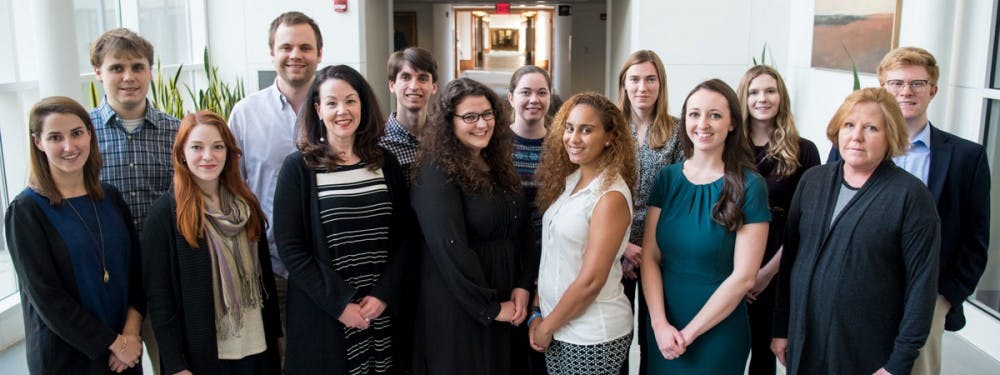On Jan. 12, Gov. Terry McAuliffe signed orders to release Messiah Johnson, a Virginia inmate who was convicted in 1998 and sentenced to 132 years in prison for a robbery he did not commit. His conditional pardon and subsequent release were secured by members of the Innocence Project at the University’s School of Law. Every year, these Law students and faculty work to remove innocent inmates like Johnson from behind bars and restore their freedom.
The Innocence Project at the University investigates and attempts to overturn unjust convictions of inmates in the Commonwealth of Virginia. The project was launched at University’s School of Law in 2008 and reviews cases of innocent inmates who have received final convictions in Virginia courts. It is part of a larger web of organizations that form the Innocence Network — a group of 69 organizations from all over the world that aims to free wrongfully convicted inmates.
“There are, you know, a shameful amount of wrongful convictions in this country,” Legal Director of the Innocence Project Jennifer L. Givens said. “Each Innocence Project is doing what it can … In its particular area and its jurisdiction to try to reverse wrongful convictions.”
Notably, an organization in the Innocence Network was featured on the first season of the popular 2014 podcast “Serial,” which investigated the 1999 murder of 18-year-old Baltimore high school student Hae Min Lee. Her ex-boyfriend Adnan Syed was convicted and sentenced to life imprisonment for her murder but always maintained innocence. Members of the Innocence Project took on the case and searched for new leads and alternate suspects. Syed was ultimately granted a new trial.
The Innocence Project at the University is comprised of two clinics that allow law students to gain real-world experience and valuable skills through case investigation. The first is a volunteer student clinic that any Law student can join and aid investigations. The second is a for-credit yearlong clinic in which second- and third-year Law students can apply to and receive academic credit. Every year, Givens and Director of Investigation Deirdre M. Enright of the Innocence Project choose 12 Law students to join the for-credit clinic.
Students who are accepted into the for-credit clinic spend some time in the classroom, but most of their time dedicated to case investigation. Each student is assigned to two accepted cases which they work on in teams of three to four under faculty guidance. As students acquire more knowledge and confidence, they are usually granted more independence in their investigations.
The students usually spend between 12 and 15 hours a week on their coursework and their cases, but sometimes case demands may require students to put in additional hours. Over the course of the year, the students gain hands-on experience by interviewing clients and witnesses, reviewing case files and court records and formulating litigation strategies. The students often have to travel throughout Virginia to uncover the facts of their cases and speak to clients and witnesses.
“[The clinic] provides a really great opportunity for the law students here … To get their hands dirty on real cases with real clients where what they do really matters, and they can see the fruits of their labor when somebody walks out of prison,” Givens said.
Generally, the for-credit clinic and the volunteer clinic each work on six separate cases at one time. All the while, new cases are constantly being screened to assess whether there is enough evidence of innocence to take on the case. Most of the cases reviewed involve crimes of robbery, rape and murder.
If a current case closes or a team is waiting for a court response, the team will be assigned a new case.
“We generally go chronologically [down the list of accepted cases] but within that chronological range if there’s one that you know looks ... The person really has a good chance of being innocent, then that’s probably the one that we would take,” second-year Law student David Rubin said.
Over the course of a year, the for-credit clinic usually reviews and works on roughly eight to 10 cases, and the volunteer clinic looks at about 12. However, these numbers vary from year to year.
Reversing a wrongful conviction is also a very slow process. The Innocence Project is generally able to secure freedom for one client a year, even if the client’s conviction has not been overturned yet. Currently, the clinics have legal pleadings or pardon requests pending in eight cases.
“It’s a pretty awesome thing to be able to be a part of,” Givens said. “[The law students] become very invested in the case and in the client and they follow the cases for years long after they’ve left.”
Rubin participated in the volunteer clinic during his first year and was accepted into the for-credit clinic last summer. So far, he has worked on three cases in the for-credit clinic.
“[Enright and Givens] are like the coolest, smartest lawyers so … Just to hear their stories about the ways they’ve done things — I’ve picked up a lot of pointers,” Rubin said. “It’s always a nice feeling driving back from an investigative trip knowing that we got what we went out there to get.”
Through the clinics and the Innocence Project, Rubin has gained a lot more than just credit for school.
“Personally, it’s just really nice to work on something that unquestionably matters,” Rubin said. “To research all night is inspiring when you know that it could lead to freeing an innocent person.”







